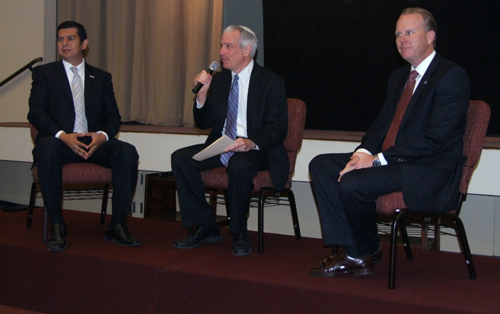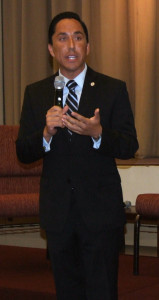
Story and photos by Donald H. Harrison

LA JOLLA, California–Runoff candidates for San Diego Mayor, Kevin Faulconer and David Alvarez, on Tuesday expressed warm feelings for Israel and for the American Jewish community, while sidestepping such potential hot button issues as the Mt. Soledad cross atop city-owned land and the long-pending effort by Hillel to build a new headquarters near the UCSD campus.
With the runoff election to complete the term of former Mayor Bob Filner expected to be set for February 11, the two candidates–who currently are friendly members of the San Diego City Council–answered in relaxed fashion questions that were posed to them at a breakfast forum by host Rabbi Philip Graubart and Jewish community members in the Congregation Beth El audience. The forum was sponsored by the Jewish Community Relations Council of the Jewish Federation and a broad coalition of synagogues and Jewish organizations.
Prior to the question and answer session, Acting Mayor Todd Gloria described 2013 as an “interesting year”–an allusion to the fact that Filner left office under a cloud of sexual misconduct accusations, to which he later pleaded guilty and received at-home jail time in a plea bargain. Given that Filner is Jewish, and Gloria, Faulconer, and Alvarez are not, the moment in the Conservative synagogue could have been an awkward one. However, Gloria did not dwell for long on Filner. He expressed the hope that once a new mayor is chosen that the city will focus on being fiscally disciplined, improving its infrastructure and homelessness.
Alvarez, in introducing himself, drew laughter when he quipped that “this election, like Chanukah, came at a time when it was not expected” — a reference to the fact that the first day of the holiday had coincided with Thanksgiving, whereas it more typically coincides with Christmas. At each round table in the synagogue’s social hall, there were unlit hannukiyot, each with seven unlit candles.
Faulconer also wished the crowd “Happy Chanukah,” and pointing to State Sen. Marty Block he noted that he once had been a student in one of Block’s classes at San Diego State University. Block, an active member of the Jewish community, once had served as president of the San Diego chapter of the American Jewish Committee. Like Alvarez, Block is a Democrat, whereas Faulconer is a Republican, although the race for mayor technically is non-partisan, with party labels not mentioned on the ballot.
A few in the audience seemed surprised when Rabbi Graubart asked the candidates about Israel — after all, isn’t that typically a question for someone who will deal with foreign policy, rather than with municipal affairs?
Alvarez said that he has been to functions sponsored by the American-Israel Public Affairs Committee and had planned to go on a community mission to Israel next year. Even now, with the mayoral election intervening, he still would like to go, he said. Validating Graubart’s question, he said that Israel has been a leader in finding renewable sources of energy, and he would like to see if such technology could be beneficial in San Diego County.
Faulconer, also anticipating someday traveling to Israel, said he considered it a “most important ally” and added that Israel is known as a “start up nation.” He said he wants San Diego to attract more start-up companies and believes much can be learned from Israel about business incubators.
I had the opportunity from the audience to ask the candidates their views on separation of church and state, given San Diego’s history of such controversies as the still-present Christian cross atop publicly owned Mount Soledad, and occasional instances when Christian-oriented invocations have been given at the San Diego City Council.
Neither man addressed the issue of the cross atop Mount Soledad, which has been in litigation for decades with courts generally ruling that having the large cross on public land –notwithstanding its designation as a war memorial — shows an unconstitutional city preference for one religion over all the others.
Alvarez answered the other part of the question, saying he understands the City Council of Sacramento has a good program for inviting invocations from clergy of all faiths and suggesting that is something in which San Diego could appropriately follow suit. Alvarez also mentioned his admiration for the Interfaith Committee for Worker Justice, for ” bringing people from all walks of life and all ethnic backgrounds and working toward common goals.” Rabbi Laurie Coskey serves as director of that interfaith organization.
Faulconer said separation of church and state is very important, and that the mayor and council should focus on “the job we have to do” at the city, rather than venturing into such non-government domains as religion.
A former city council candidate, Mat Kostrinsky, asked about the proposed Hillel Center that the Jewish community wants built across the street from UCSD, but which some La Jolla residents have been resisting. Instead of taking a position on whether Hillel should receive final city approval or not, both candidates criticized the slowness of city land use procedures which have kept the issue for so long in limbo, promising to work for a quicker process offering more certainty.
In another exchange, Rabbi Graubart said while there is great diversity in the Jewish community, what unifies Jews are their core values. He asked the candidates to describe their core values and tell how they would be translated in office.
Faulconer responded that he had grown up being taught by his parents that there is no substitute for hard work, and that problems should be addressed rather than ignored. He recalled when he joined the City Council seven years ago, the city was reeling from its pension problems that had been unaddressed. He said he believes leadership means taking on tough problems, while bringing people together in coalitions.
Alvarez responded that while he was born in San Diego, his parents were immigrants from Mexico raised in the Catholic faith. His father had worked hard as a janitor, and his mother toiled as a fast food worker. He was one of six children in their three bedroom house, and it was not unusual to have relatives also living with them.
He said he had a “Jesuit upbringing” in which service to others was stressed. It’s important for government to help those who need it, and to make certain that everyone has opportunities, he said.
Following up on Acting Mayor Gloria’s comment about homelessness, Graubart commented that Congregation Beth El during the winter months operates a homeless shelter. What do the candidates think San Diego should do for the homeless? he asked
Faulconer responded that the city has an obligation to help the homeless, not just by providing shelters, but by providing assistance to individuals to help them transition out of homelessness. He cautioned that there is no one easy solution.
Alvarez said he often rides a bike to City Hall from his home in Logan Heights (near the Coronado Bridge) and that along his route he sees many homeless persons. In tough economies, the problem can become even more widespread, he said, because many families are only one or two paychecks from homelessness. He too called for “wrap-around services” for the homeless population.
Bernardo Ferdman, a former Argentinian who heads the Latino-Jewish Coalition, asked about diversity and relations between San Diego and Mexico. Alvarez responded that cross-border relations have been neglected, especially the Sister City relationship that San Diego has with Tijuana. Concerning diversity, he said he believed that representatives of San Diego’s many ethnic communities should be sought out to serve on various city boards and commissions so their voices can be heard.
Faulconer said his mayoral administration will reflect the city’s diversity, especially in its appointments to boards and commissions where, by the way, “we have lots of openings.” Further, Faulconer said, he believes the city should seek out minority-owned companies to bid on city business.
To a question from Barbara Bry about what they would do in their first 90-days in office, Faulconer said he would emphasize the marketing of San Diego both to businesses and tourists. Alvarez said he would focus on making sure the city’s budget is directed at improving everyone’s quality of life and that everyone in the city has the same opportunities.
*
Harrison is editor of San Diego Jewish World. He may be contacted at donald.harrison@sdjewishworld.com